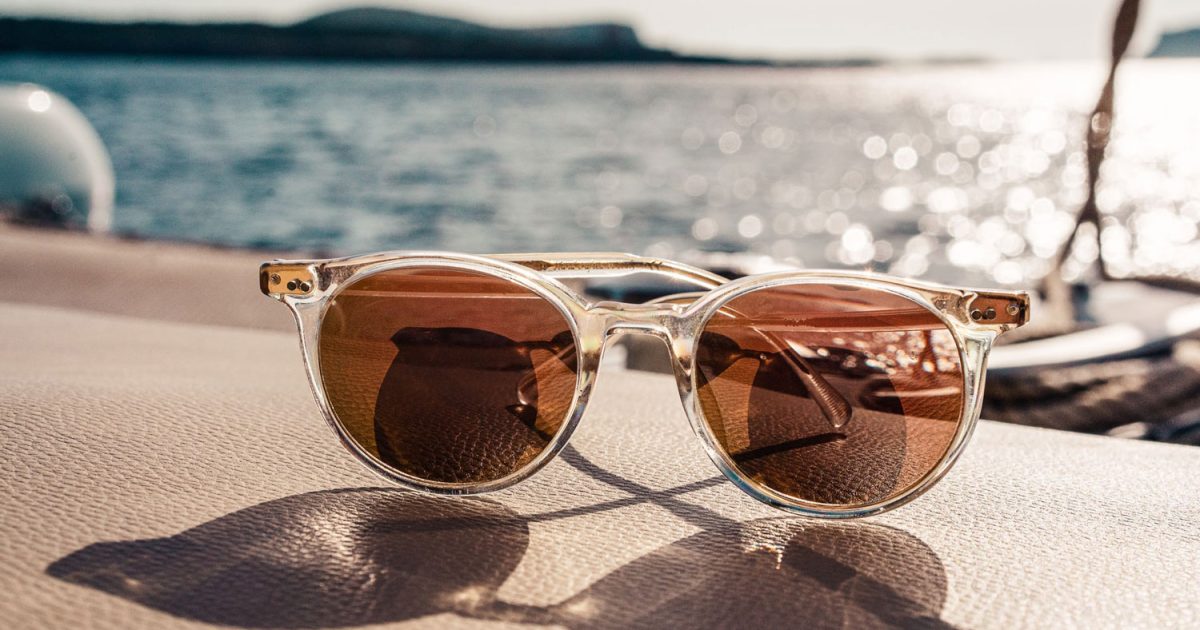Your must-have accessory in 2022: UV-protected sunglasses
Article by Chew’s Optics Specialist. 3 February 2022

If one of your goals this year is to take better care of your health, you should pay attention to this article. We often think of our physical fitness when it comes to our health – all to achieve stronger arms and slimmer waists. But don’t neglect your eyes!
Especially if you live in a country near the Equator, like Singapore, you can’t go without sunglasses. And not just any kind of sunglasses. We’re talking about sunnies that actually keep your eyes in tip-top shape by protecting them from harmful UV rays.
Everything you need to know about UV rays
Ultraviolet (UV) light is a type of electromagnetic radiation. It sits alongside radio, microwave, infrared, X-ray and gamma ray radiations on the electromagnetic spectrum. More specifically, it’s positioned next to visible light waves. For humans, UV rays are totally undetectable to the naked eye, but certain insects such as bees are able to see them.
There are three types of UV rays – UVA, UVB and UVC. The most destructive one is UVC, but it usually wouldn’t affect us because it’s absorbed by our planet’s atmosphere. UVB is the one responsible for sunburn, while UVA penetrates deeper into the skin and causes skin aging. As a dangerous component of sunlight, UV light should be avoided in general. Here’s why.
The importance of UV protection
It’s a known fact that excessive exposure to UV rays can damage your DNA, cause mutations and lead to the appearance of basal cell carcinoma (BCC) and squamous cell carcinoma (SCC), both of which are forms of skin cancer. If the exposure is strong enough to create sunburn, you may develop melanoma, the third and most damaging form of skin cancer.
What’s more, the damage done to your skin cells is cumulative and often permanent. If you’re in the habit of going under the sun without sunscreen, it might be just a matter of time before it develops into a tumour. Besides cancer, your skin may also suffer from premature aging.
A lesser-known fact is that UV radiation can hurt your eyes as well. Without any protective barrier between your eyes and the sun’s UV rays, you may increase your risk of developing cataracts, eye cancer, corneal inflammation and growths on the eye. Even if you try to shield your eyes from the sun by looking down, you can still come into contact with UV light reflected from grass, soil, water, dry sand and sea foam. There’s even a study that linked UV exposure to the generation of stress hormones, which may affect your memory and cognitive function.
It’s a no-brainer that you should arm yourself with some anti-UV essentials, including sunscreen, a hat, covered clothing and a pair of UV-protected sunglasses.
How to know if your sunglasses are UV-protected
Let’s start with the myths. People seem to think that the darker your sunglasses, the more protection they provide. However, UV light and visible light are not the same thing. This only helps to block the amount of visible light. When it comes to blocking UV rays, it doesn’t matter how dark your sunglasses are.
Similarly, the colour or tint of your sunglasses isn’t a good indicator of how well they protect against UV rays either. They have multiple benefits – from increasing colour contrast and perception, to reducing glare and brightness – but UV protection is not one of them.
There’s also no real association between the price range of the product and its ability to block UV rays. Although a lower price tag doesn’t necessarily equate to zero UV protection, it’s generally a good idea to invest a little more to get a higher-quality pair of sunglasses. What’s most important is buying them from a reputable brand or from a professional optometrist like Chew’s Optics.
For maximum protection, choose sunglasses with UV400 lenses. They’re made with a material or coating that provides almost 100% protection against UV light. The “400” comes from its ability to block wavelengths of up to 400 nanometres, which includes UVA and UVB rays.
Most polarised lenses also come with complete UV protection. If your sunglasses are made with uncoated plastic lenses or untreated glass lenses, you should probably head to the optical shop for a new pair that properly shields you from those harmful, invisible rays.
Don’t forget about your spectacles
For the spectacle-wearers, you can also opt for clear lenses that come with UV-blocking properties. Some examples of materials that provide 100% UV protection include photochromic and anti-blue ray lenses.
When in doubt, simply get your glasses checked by an optometrist. Better yet, instead of shopping at an optical store, buy your spectacles (and sunglasses) from a trusted optometrist in Singapore. Chew’s Optics, for instance, is a seasoned, professional optometrist that provides precise and thoughtful eye health services, along with a stylish catalogue of eyewear. Here, you can try new eyewear styles and make sure your eyes are healthy and well-protected.
Swing by Chew’s Optics at 144 Teck Whye Lane, #01-211. We’re open daily except Mondays. For further enquiries, contact us at +65 8314 7093.
